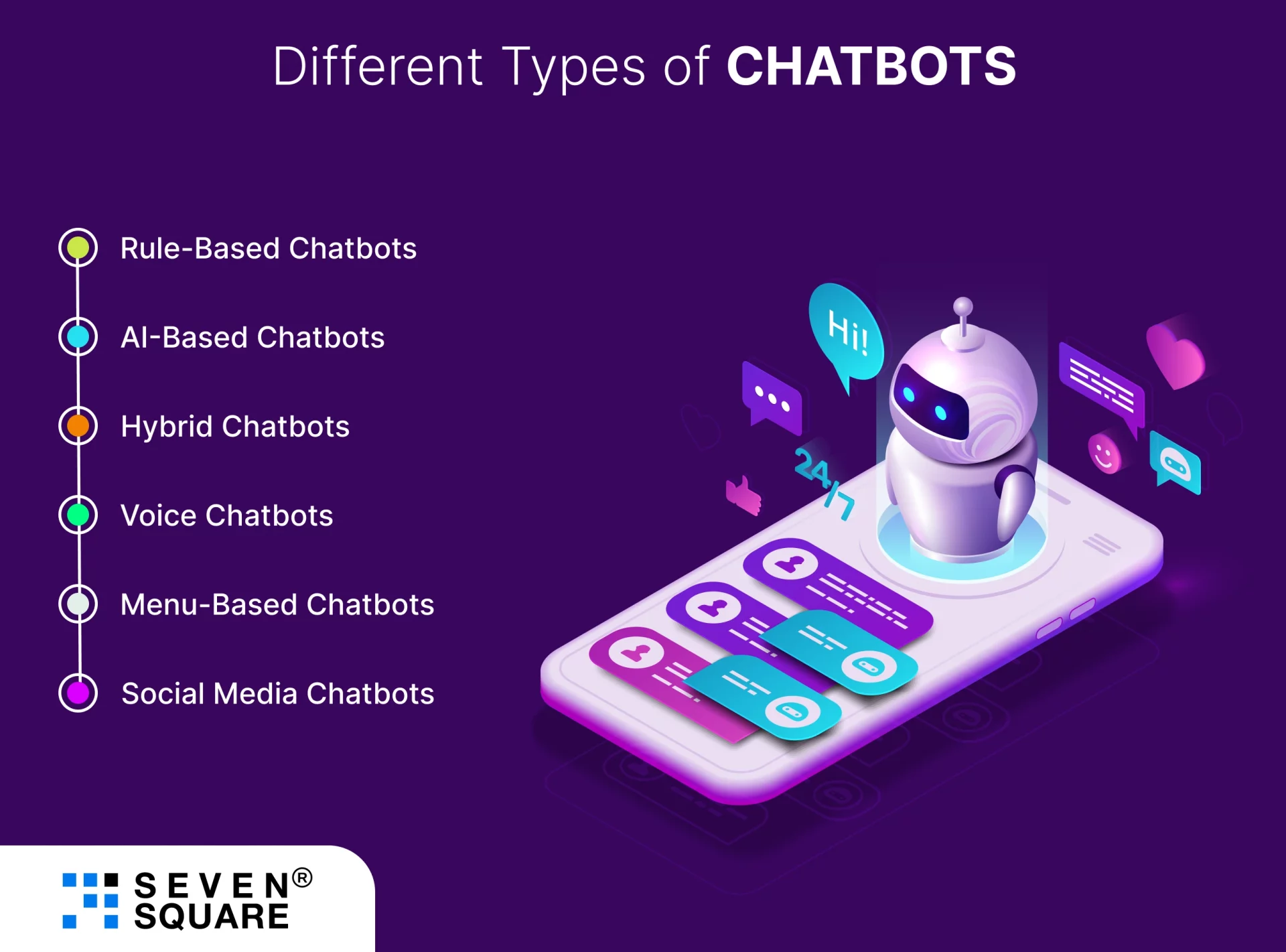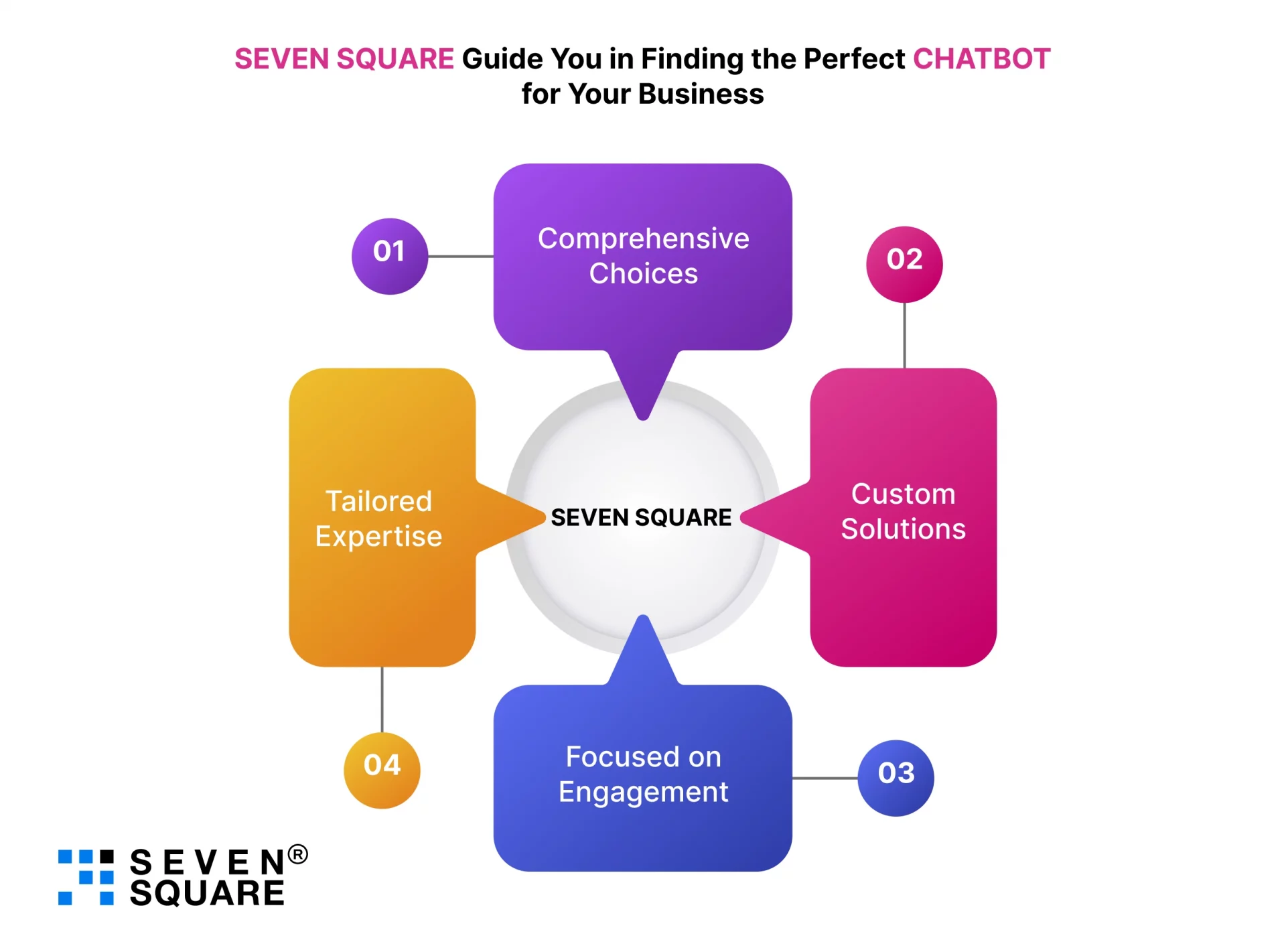Users’ expectations are always evolving—they want the best experience, no matter where they are. By integrating the right chatbots into your business, you can stay ahead of the competition and deliver an exceptional user experience.

The chatbot market, currently valued at $7.01 billion, is projected to grow at a staggering CAGR of 24.32%, reaching $20.81 billion by 2029.
Chatbots are now indispensable tools for enhancing customer engagement and streamlining business processes.
Curious about which chatbot type is best for your business?
You’re in the right place.
We’ve put together a comprehensive list of chatbot types to help you find the perfect fit for your business growth.
How Are Chatbots Changing the Way Businesses Connect with Customers?
Chatbots are software applications designed to interact with humans through text or voice, revolutionizing how businesses handle customer service. They allow companies to automate responses, guide users through processes, and provide personalized recommendations.
Whether powered by predefined rules, artificial intelligence (AI), or a combination of both, chatbots are versatile tools that can benefit a wide range of industries.
For businesses aiming to enhance customer engagement, improve efficiency, and offer 24/7 support, chatbots have become indispensable.
What Makes Chatbots So Effective?
Chatbots have become a go-to tool for many businesses, enhancing customer experiences on their websites.
Here’s a quick and easy guide to the four key steps that power their interactions:
- 1. User Input : It starts when a user types a message or speaks something to the chatbot. This input from users can be a simple question or a more complex request depending upon the chatbot’s capabilities.
- 2. Natural Language Processing (NLP) : Uses NLP to analyze the user’s input & break down the text or speech into smaller parts. It helps the chatbot to easily understand the keywords, intent, and context to know what the user is asking.
- 3. Response Generation : According to the analysis, the chatbot decided that the best response was. If it’s rule-based then it will follow predefined scripts but if it’s AI-based then it will use machine learning algorithms to create a response that is best for the user’s query.
- 4. User Interaction : Now the chatbot delivers the response to the user through chat or voice output. The communication continues as the chatbot engages in a conversation, addressing follow-up questions or tasks as needed.
How Many Different Types of Chatbots Exist?

The market offers a variety of chatbots, each with unique features. In this guide, you’ll discover 6 different types of chatbots and their standout qualities. Explore this list to find the one that best suits your needs.
-
1. Rule-Based Chatbots : These rule-based chatbots follow predefined scripts and rules to provide specific responses according to the user input. These chatbots work based on the keywords to give several programmed responses. They are easy to implement and ideal to handle repetitive tasks like answering frequently asked questions to users.
- Predictable Responses : It gives responses that are consistent and predictable for smooth customer interactions.
- Quick Response Time : These types of chatbots improve user satisfaction by minimizing processing time for instant replies.
- Easy to Learn : One of the main benefits of using these chatbots is that they are easy to learn.
- Highly Controllable : Businesses have full control of the chatbot’s responses to reduce the risks.
– Use Cases
- Customer Support : It can be used to provide quick answers to FAQs related to business hours and return policies.
- Appointment Scheduling : Rule-based chatbots can help to automate the booking process by leading users through available time slots and confirming appointments.
- Basic Troubleshooting : They also help users to resolve common issues by providing them with step-by-step solutions.
-
2. AI-Based Chatbots : Various AI-based chatbots use machine learning and natural language processing (NLP) to understand and respond to user queries more accurately. They can interpret complex language patterns and learn from each interaction to improve their performance. These bots can handle multiple conversations and complex customer service tasks.
- Self-Learning : It updates automatically to understand the language and intent for improving results based on the input.
- Emotion Recognition : Advanced AI bots can detect and give more emotional answers based on the users’ emotions in question.
- Dynamic Change : It changes the responses in real-time based on the conversation and its context.
– Use Cases
- Customer Service : It can handle complex customer queries like technical support by understanding detailed requirements.
- Lead Qualification : Connect with customers by asking specific questions, identifying quality leads, and directing them to the sales team.
- Personalized Marketing : These chatbots can be used to provide custom product recommendations based on the user’s past interactions.
-
3. Hybrid Chatbots : Hybrid chatbots are a combination of rule-based and AI-based chatbots that provide a flexible solution to complex user interactions. These bots can run according to predefined rules for simple queries but also switch to AI-driven answers when they face more complex inquiries. This dual capability provides a better user experience and makes them ideal for businesses that require both structured and intelligent responses.
- Selective AI Implementation : AI is only used when it is necessary to optimize the resources and respond more accurately.
- Fallback Mechanism : If AI doesn’t understand the query then the bot will start giving rule-based responses.
- Better Security : Businesses can easily turn off AI and minimize the risk of data breaches.
– Use Cases
- eCommerce Support : They guide users through product selections with some predefined options and also provide personalized suggestions based on AI analysis.
- Event Management : Hybrid chatbots can automate event registrations with rule-based processes and AI can be implemented to answer complex attendee queries.
- Healthcare Suggestions : They include some symptom checkers with personalized medical advice to provide the best support.
-
4. Voice Chatbots : Voice bots are customized chatbots that can communicate with users by using voice commands over text. They are integrated with natural language processing and speech recognition technology to understand and respond to the language. Voice bots are very useful for hands-free interactions and are mostly seen in virtual assistants like Siri and Alexa.
- Real-Time Language Translation : Some voice chatbots provide quick translation services to remove the language barrier.
- Multilingual Support : It can understand and respond in multiple languages to satisfy various users.
- Voice Recognition : These bots can recognize users by their voice to provide better security and personalization features.
– Use Cases
- Virtual Assistants : Most of the time voice chatbots are used in smart devices like Amazon Alexa or Google Home to provide hands-free control of smart home, weather updates, or entertainment.
- Customer Service Helplines : They can be used to replace IVR systems to improve the user experience for phone-based customer support.
- Language Learning : Various voice chatbots can be used as language tutors to help users practice speaking and listening skills in a new language.
-
5. Menu-Based Chatbots : Menu-based chatbots can instruct users through predefined options or menus and help them to get the information or service. They are user-friendly and come with simple interfaces so that users can easily find what they need. Various menu-based chatbots are perfect for handling simple tasks like booking appointments and browsing products.
- Minimal Input : The users don’t have to type, they can simply click on options to use it.
- Better Outcomes : It is perfect for tasks with clear objectives so that users can reach specific endpoints.
- Customizable Options : You can easily customize these chatbots according to the requirements of businesses and users.
– Use Cases
- Surveys and Feedback : These chatbots can be used to get user feedback and conduct surveys by showing options in a structured way.
- Restaurant Reservation : It allows the users to book tables by selecting options like date, time, and party size from the menu.
- Service Selection : They help customers in selecting the best service package or plan based on their predefined choices.
-
6. Social Media Chatbots : These Social media chatbots can operate within social media platforms like Facebook Messenger, WhatsApp, and Twitter. Various social media chatbots help businesses to connect customers directly with their social media platforms to automate responses so they can easily purchase products or book services. Social media chatbots improve the brand’s visibility and customer interaction by using popular platforms.
- Native Social Media Integration : Smoothly integrate the features of social media platforms like polls on twitter and stories on Instagram.
- Real-Time Analytics : In these chatbots, you can track user interactions in real time and adjust strategies quickly.
– Use Cases
- Promotions and Offers : These chatbots are mainly used to give discounts and special offers to users within social media chats for better sales.
- Event Reminders : Social media chatbots are used to send reminders and updates about upcoming events or webinars to keep users updated.
What’s the Best Way to Choose the Right Chatbot for Your Business?
Choosing the right type of chatbot for your business depends upon various factors like your business goals, customer requirements, and the tasks you want the chatbot to handle.
Here are some of the steps that you need to follow to choose the best type of chatbot for the growth of your business:
-
1. Define Your Business Goals
- You need to define what you want to achieve by using the chatbot. There are mainly six types of chatbots and they can be used to provide customer service, better sales, and automate repetitive tasks for your business.
- That’s why defining the main requirements of your business will help you to select the most suitable type of chatbot.
-
2. Complexity of Conversations
- If your business needs to handle simple and repetitive tasks like answering FAQs then a Rule-Based Chatbot can be perfect for you.
- To handle more complex tasks you should choose an AI-based Chatbot or a Hybrid Chatbot because they can provide a better user experience.
-
3. Understand the Requirements of Your Audience
- You need to think about how your customers prefer to connect with your business.
- If your audience is more active on social media then a Social Media Chatbot can be an option for better engagement.
- For users who prefer hands-free interactions then a Voice Bot would be perfect.
-
4. Define Resources and Budget
- If you are thinking about implementing an AI-based or Hybrid Chatbot in your business then it requires more investment in terms of time, technology, and budget.
- While Menu-Based or Rule-Based Chatbots are more cost-effective and easier to implement so always choose the chatbot according to your resources.
-
5. Future Requirements
- Always think about how your business will look in the future and how you are planning to manage its growth.
- If you need to handle more complex interactions then starting with a Hybrid Chatbot allows you to scale up your business by integrating AI capabilities whenever needed.
-
6. Integration with the Current System
- Make sure to choose the chatbot that you can integrate smoothly into your existing customer relationship management (CRM) systems, e-commerce platforms, or another platform.
- It is important when you are thinking about using AI-Based and Social Media Chatbots because they need to access various data sources.
-
7. Overall User Experience
- The user experience is also important for the growth of your business. A Menu-Based Chatbot can be perfect for users who want smooth navigation because they are simple and easy to use.
- Ai-based chatbots are known for personalized experience so you can choose this if you want to target an audience who wants a custom experience.
How Can Seven Square Guide You in Finding the Perfect Chatbot for Your Business?

We understand that choosing the right chatbot can make a significant difference in your business success.
Here’s how we ensure you find the perfect match:
- Tailored Expertise : Our team brings deep industry knowledge to guide you through the complexities of chatbot selection. We don’t just recommend a solution; we craft a strategy that aligns with your unique business needs.
- Custom Solutions : We dive into the specifics of your business—your goals, audience, and technical landscape—to offer personalized chatbot recommendations that truly fit.
- Comprehensive Choices : Whether you’re looking for a basic, rule-based chatbot or a cutting-edge AI-driven solution, we provide you with a range of options and help you choose the one that will deliver the best results.
- Focused on Engagement : Our priority is to help you select a chatbot that not only enhances customer interactions but also streamlines your operations, making your business more efficient and effective.
With Seven Square by your side, you’ll have the confidence that the chatbot you choose will elevate your business and set you apart from the competition.
FAQs
- There are mainly two types of chatbots: Rule-Based Chatbots and AI-Based Chatbots.
- Rule-Based Chatbots : These chatbots work on predefined rules and scripts. They are programmed to handle tasks and queries according to the programmed rules.
- AI-Based Chatbots : These AI-based chatbots continuously learn from the interactions and provide more personalized responses.
As a business owner, you need to look for key features like NLP capabilities, integration with the current system, analytics & reporting, customization, security, etc. in a chatbot to ensure it will be compatible with your business.
The future of AI-based chatbots is bright because you can see the advancements in areas like NLU understanding, integration with IoT, cross-platform compatibility, industry-related solutions, and many more.
- Chatbots are beneficial for different types of eCommerce stores and platforms.
- 24/7 Support : One of the main advantages is that the chatbot provides 24/7 support so customers don’t feel left out.
- Suggestions : They can also suggest products based on the customer’s previous preferences.
- FAQs: Chatbots can also give quick responses to some of the frequently asked questions from customers.
- Yes, there are benefits of using chatbots for lead generation and some of them are mentioned here.
- Quick Support
- 24/7 Availability
- Customized Interactions
- Data Gathering
- Lead Qualification
- Cost-Effectiveness
- Smooth Integration with Marketing Tools
Yes, ChatGPT is an AI-Based chatbot that uses NLP to provide more accurate and human-like conversations. It can be used for complex different types of tasks like coding, writing, strategies, and many more.
Level 3 chatbot means an AI-based chatbot that remembers your past interactions and provides better results with whom you can easily connect.